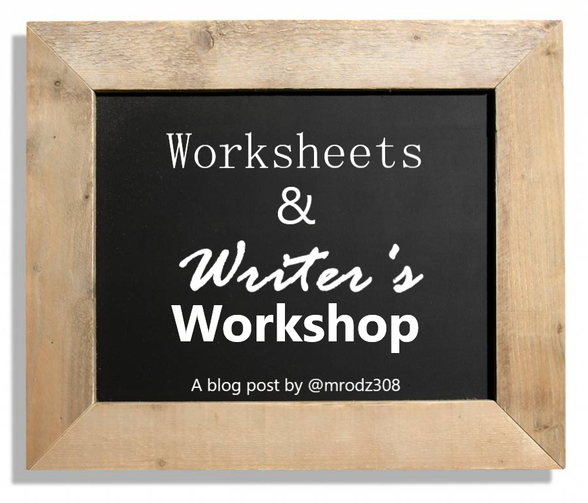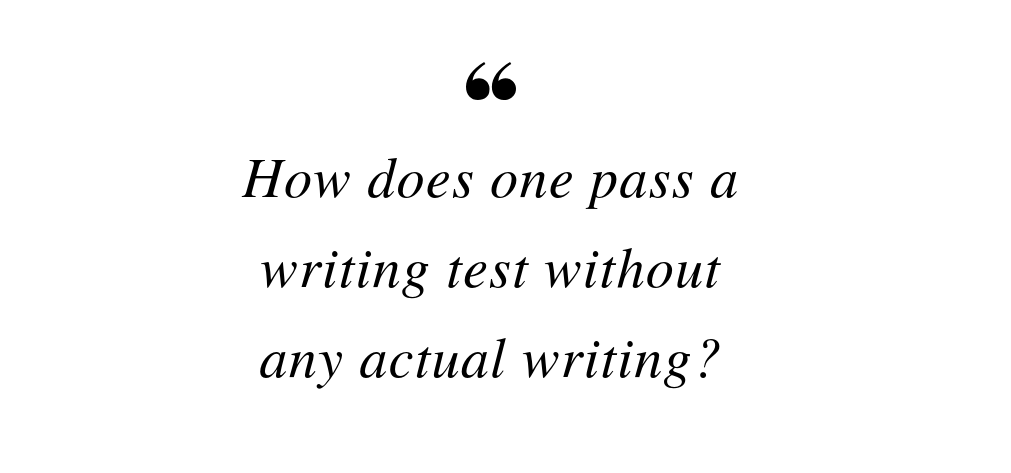|
As I write this, I take a breath and wonder… how did I learn to love writing? I’m certainly not that great of a writer, so how did words become for me significant impactful drivers of language, communication, and passion? Was it a worksheet? Ummm… no. Simply no. Worksheets do not grow writers. Authentic, meaningful, purpose driven writing grows writers. So, how do worksheets fit into this space? Well, they don’t really… not really. At least, not the “drill-and-practice” kind. There are some worksheets that do well to support the process of a writer, and then, there are those that absolutely, unequivocally… do not fit. Is there really a difference? Yes. One benefits the writer, and the other does not. Student-Centered Worksheets They do exist. Student-centered worksheets, designed to fit the needs of novice writers in the classroom, really do exist. When teaching writers, these… types of worksheets can be used to help a writer be accountable for their work, notice pieces of themselves and their writing in ways that help to move them forward. These worksheets are open-ended tools used to support authentic student writing. Growing writers with differentiated open-ended tools like these, helps create independent writers who experience enough authentic writing to help them thrive and grow. Katy Wood Ray offers some great examples in her book: The Writer’s Workshop, Working through the Hard Parts (And They're All Hard Parts). You will also find free copies of a Writing Workshop Daily Log in both English and Spanish below. In a writer’s workshop, we want all learning to be student-centered. Unfortunately, the worksheets that typically reign in many classroom environments are not student-centered. They are instead, skill-based. Skill-Based Worksheets On the opposite end of the teaching spectrum, there are those “other” worksheets. They are what we typically call “drill-and-practice” worksheets. These are the fill-in the blanks, bubble-in, check the box, cut and paste, underline the word that best fits, circle the correct answer (because there is only one correct answer) type of worksheet, offered in single sheet form, packet form, workbook form, and manufactured by many, many different packaged writing programs. They are, more often than not, a “one size fits all” type of worksheet. They are easy to grade, often designed for the drill and practice of isolated grammatical skills or formulaic structure, and centered around… not the student, but around the practice of isolated skills. Using worksheets to teach isolated grammatical skills can stifle a writer. It may increase an ability to select the correct answer on a worksheet, but it will NOT grow fearless fluent creative writers. One Test Says A Lot Besides the well-established research on the topic of worksheets, I had the opportunity to witness the disheartening results of one student’s writing test. Buried within the many scores and results of one year’s State of Texas Academic Assessment and Readiness (STAAR) Writing test, I noticed the results of one particular student. This one stood out. With my own eyes, I looked upon the results of a student who passed the 4th grade STAAR Writing test. This student answered the multiple choice section, completely neglected the composition portion of the test, and passed. This student passed the State of Texas 4th grade writing test without actually having to write a single word. Not one word. How does one pass a writing test, without any actual writing? The reality of how students are tested leaves space for some thought... Does testing decrease our students opportunities for authentic writing experiences? That can be a question up for debate. And then there are some things that are not up for debate. What we know to be true is that worksheets do not make writers. Writing creates writers. This is a problem that does not reside in one school or one state, but we can make it better. Should it change the way we teach writing? Yes. Well informed classrooms are continuously evolving and improving in practice. It is the never ending method of assuring best practice. What matters is that we teach kids to write through authentic and meaningful writing experiences. How do we change things?
One important change that can make an impact in a classroom where we work to grow writers is to ensure the absence of skill-based worksheets. There are many other ways to check if students are “getting it.” Using drill-and-practice worksheets can be detrimental to the development of a writer. This is especially true for bilingual and multilingual students. I implore teachers of writing to experiment without a worksheet, reach out for help, and then try again. This is after all, how we expect our students to try something new, learn, and grow. Life-long learning happens when learners get to play with what they’re learning, manipulate it, and create something new with it. This kind of learning happens outside the limits of a worksheet. The best way for a student to become a better writer is to… write. Write every day. Write for authentic and meaningful purpose, in language rich environments that center around using a writing process.
12 Comments
Katina
11/19/2018 04:53:12 am
Great blog! I agree... writing matters and mindless fill in the blank doesn't!
Reply
Marina
11/20/2018 02:06:28 pm
Thanks for reading Katina! Giving kids a chance to write, & write often, is what matters most.
Reply
Kim
11/19/2018 04:34:10 pm
Favorite line: "Life-long learning happens when learners get to play with what they’re learning, manipulate it, and create something new with it."
Reply
Marina
11/20/2018 02:29:25 pm
Hi Kim! I love that line, too. Extending on what we’re learning is where play comes in... it forces us to improvise & pushes us to “build cognitive links and connections.” Master Jazz musician, Miles Davis, describes it well in one of his quotes: “When you’re creating your own sh*t, man, even the sky ain’t the limit.”
Reply
Jennifer
11/27/2018 03:40:13 pm
Interesting read. I'm considering the same approach but concerned about my scores. What were your scores in comparison to the state?
Reply
Thank you for sharing, Jennifer. You are not alone with that concern.
Reply
Marta
11/28/2018 05:51:10 pm
This blog was great, you’re always so effective at communicating your point— but good golly, that made me frustrated!!! The student test part I mean. Of course I completely agree that worksheets should help the student find their voice rather than measure their skills. How can you measure what isn’t being built on in the first place. I would love for teachers to be more fearless about branching out from the comfort-zones of worksheets. But it did lead me into thinking about all the different things that may be holding teachers back from trying new methods. It just makes sense to teach in a way that’s helps students grow and develop their identity (which can’t be found in multiple choice answers) so I’m a bit at a loss as to the apathy schools have towards it. I hope your example changes that!!!!
Reply
Hi Marta. Thank you for your thoughtful comment.
Reply
Rob
12/1/2018 05:55:38 am
"It may increase an ability to select the correct answer on a worksheet, but it will NOT grow fearless fluent creative writers." I love this line, because I want to grow writers who are fearless in their risk taking and creative in their artistry. I find myself conflicted by my institutions push for hard data that depicts a clear cut picture of each student's abilities. As you know, my conferencing notes during writer's workshop is often smiled at but rarely taken seriously, because it's not as comprehensive as little paper and digital (skill-based) learning checks. I feel like I'm constantly writing a tightrope between these two forces.
Reply
That line does remind me of the tightrope each of us walk to try and balance, between good practice and test practice.
Reply
Kristin
12/2/2018 10:50:33 am
Love the boldness in your writing. I hope more teachers will be willing to step out of the box, to be brave in the face of high stakes testing, and to follow their hearts to what they know is right for children.
Reply
Thank you Kristin. I'm working on the courage to write what I've learned and what I'm learning.
Reply
Your comment will be posted after it is approved.
Leave a Reply. |
AuthorMarina Rodriguez (@mrodz308) is a California native, dual language teacher, National Writing Project, Heart of Texas Writing Project Teacher Consultant, Kidblog Ambassador, and co-author of Two Writing Teachers. Archives
December 2019
Categories
All
|


 RSS Feed
RSS Feed